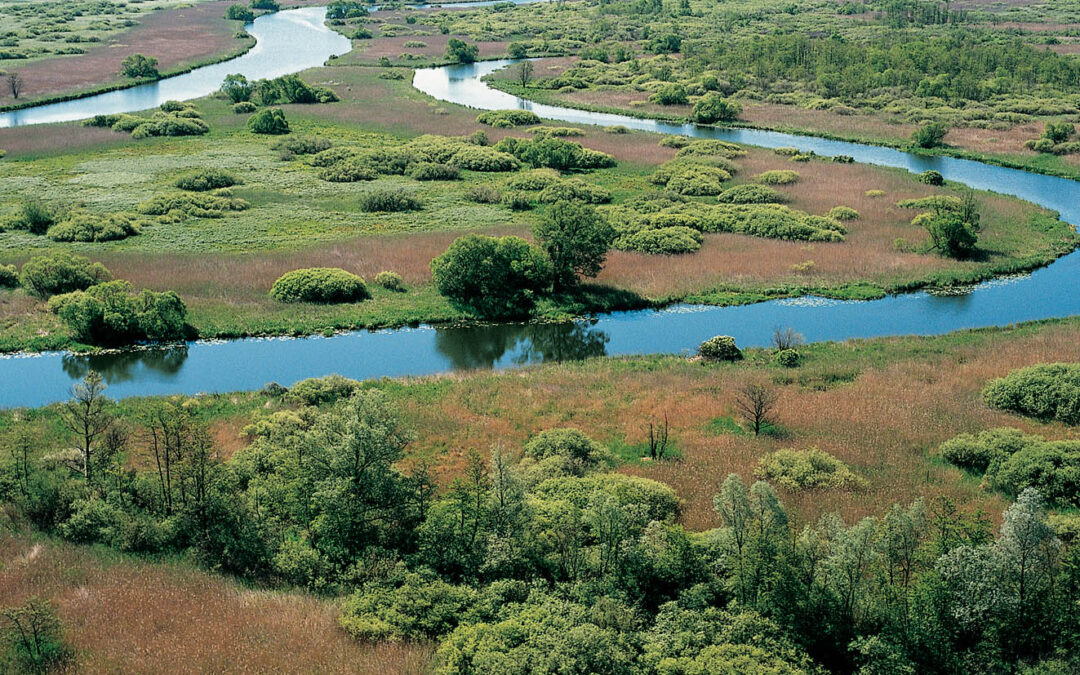Keep our news free from ads and paywalls by making a donation to support our work!

Notes from Poland is run by a small editorial team and is published by an independent, non-profit foundation that is funded through donations from our readers. We cannot do what we do without your support.
Poland’s parliament has approved plans by the government to create the country’s first new national park in 24 years. However, the right-wing opposition voted against the bill, and it remains possible that opposition-aligned President Karol Nawrocki will exercise his right to veto it.
The park would be created in the Lower Oder Valley, an area that runs along the river marking the border between Poland and Germany. On the German side, it is already protected as a national park, whereas in Poland it currently only has the lower classification of a landscape park.
The proposed Lower Oder Valley National Park would cover an area of 3,856 hectares around the villages of Kołbaskowo and Widuchowa as well as the city of Szczecin. It could later be enlarged by an additional area around the town of Gryfino, extending the park to a total of 6,051 hectares.
The idea for creating the park has been supported by local activists in the region as well as Poland’s national government, a coalition ranging from left to centre-right.
However, it has been criticised by the national-conservative opposition Law and Justice (PiS) party, which claims it could threaten commercial shipping in the Oder River.
In May, the plans received approval from the regional assembly in West Pomerania province, where the park would be located. They then passed to the national parliament.
In a vote on Friday in the Sejm, the more powerful lower house, a majority of 226 MPs voted in favour with only 198 against. The votes in favour came mainly from the ruling coalition while those against came from PiS and the far-right Confederation (Konfederacja), another opposition party.
The bill now passes to the upper-house Senate, where the government also has a majority and which can in any case only delay legislation or suggest amendments but not overrule the Sejm.
Friday’s vote was celebrated by climate and environment minister Paulina Hennig-Kloska, who posted a video from the area of the planned park.
She denied the “fake news” that the park would hinder navigation of the Oder and noted that the project had been extensively consulted with – and received the backing of – local communities, including farmers and anglers.
Sejm dał dziś zielone światło dla utworzenia nowego Parku Narodowego w Polsce.
Wbrew fake newsów na jego temat, będzie to impuls do rozwoju turystyki, lokalnej przedsiębiorczości, nie zablokuje żeglowności Odry i skorzysta na nim przyroda.
Prace nad parkiem trwały długo,… pic.twitter.com/Ph3bxPZApG
— Paulina Hennig-Kloska (@hennigkloska) September 26, 2025
Local activists have been seeking to establish the park for three decades. Those efforts intensified after an ecological disaster in 2022 during which pollution of the Oder River caused toxic algal blooms that led to as many as half of the river’s fish dying out.
However, some local residents, including anglers, have expressed opposition to the plans, while PiS has warned about the impact on shipping given that a national park classification confers a higher level of protection on the area, including waterways.
In response, the local authorities took into account concerns expressed by Poland’s state water authority and the Seaports Authority of Szczecin and Świnoujście and excluded certain areas from protection, including the Klucz-Ustowo and Gartz-Marwice channels, in order to facilitate inland navigation.
The government wants to establish Poland's first new national park in 23 years.
While environmentalists support the proposal, local anglers and politicians are sceptical, finds @ZenkerLuisa on a visit to the Lower Oder Valley https://t.co/OQAz2GKlnr
— Notes from Poland 🇵🇱 (@notesfrompoland) October 7, 2024
But, speaking in parliament yesterday, PiS MP Artur Szałabawka called the plans “a huge fraud” and claimed that “climate lunatics are implementing Germany’s will”, reports news website OKO.press.
Once approved by the Senate, the bill to create the park passes to PiS-aligned President Nawrocki, who can sign it into law, veto it, or send it to the constitutional court for assessment.
Nawrocki has regularly clashed with the government since taking office last month and vetoed a number of its bills. However, he has so far not indicated what his views on the creation of the park are, notes OKO.press.
Poland currently has a total of 23 national parks, covering around 1% of the country’s territory. The first to be established, in 1932, was Pieniny National Park on the mountainous border with Slovakia. The most recent to be created, in 2001, was Warta Mouth National Park, which also sits along the border with Germany.
Amid an ongoing wildfire in Poland’s biggest national park, @donaldtusk has pledged tough punishment for arsonists who start fires on behalf of foreign intelligence services.
"This would have to be treated as an act of treason," the PM said. https://t.co/42XzUvmgTi
— Notes from Poland 🇵🇱 (@notesfrompoland) April 22, 2025

Notes from Poland is run by a small editorial team and published by an independent, non-profit foundation that is funded through donations from our readers. We cannot do what we do without your support.
Main image credit: Nefesz/Wikimedia Commons (under CC BY-SA 4.0)

Daniel Tilles is editor-in-chief of Notes from Poland. He has written on Polish affairs for a wide range of publications, including Foreign Policy, POLITICO Europe, EUobserver and Dziennik Gazeta Prawna.



















